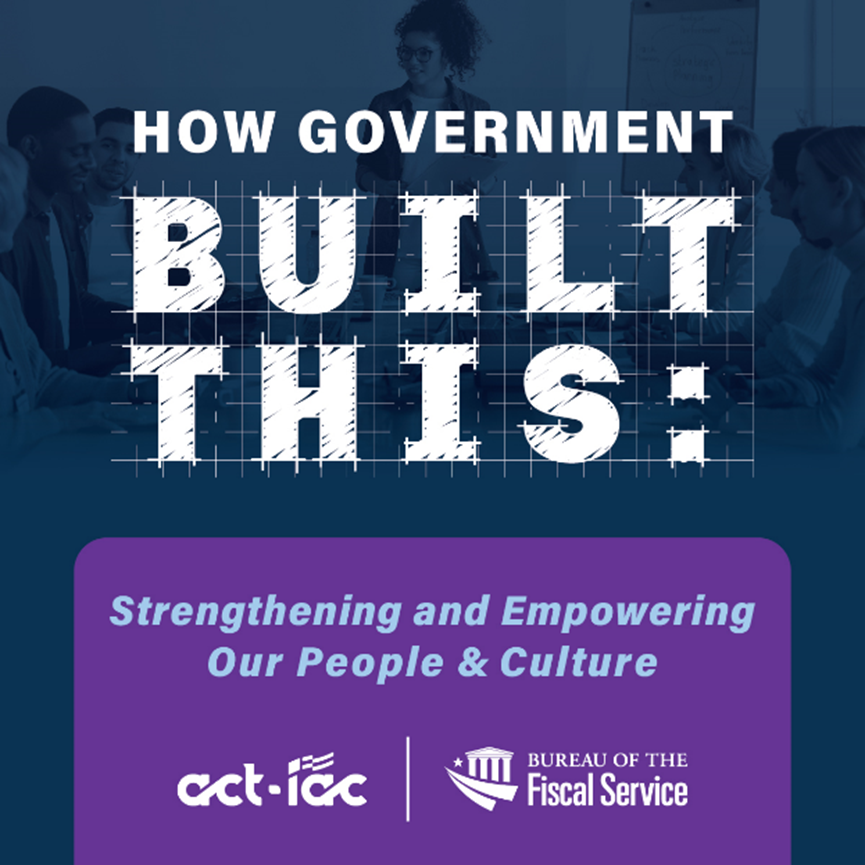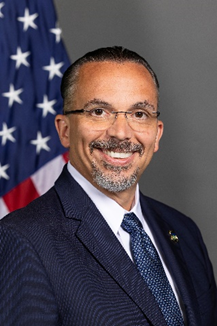

‘How Government Built This’ Innovation Spotlight: Strengthening and Empowering Our People & Culture – Importance and Value of Mentoring

Welcome to “How Government Built This,” a podcast and blog post series developed by the Department of the Treasury’s Bureau of the Fiscal Service Office of Financial Innovation and Transformation (FIT) in collaboration with the American Council for Technology and Industry Advisory Council (ACT-IAC). This series will spotlight trailblazers exploring the intersection of innovation and Diversity, Equity, Inclusion, and Access or DEIA across government. Resources and links mentioned in each podcast will also be available at actiac.org/thebuzz. This episode also is co-sponsored by the National Council of Hispanic Employment Program Managers.
 Javier Inclan, Assistant Inspector General for Management and CIO, Office of Inspector General, National Science Foundation
Javier Inclan, Assistant Inspector General for Management and CIO, Office of Inspector General, National Science Foundation
Mr. Inclán has responsibility for the OIG's budget, human capital, IT operations, DEIA, training,
policy and planning, and other administrative support services.
He also serves as a member of the Senior Executives Association Board of Directors and as the
Vice-Chairperson of the National
Council of Hispanic Employment Program Managers. Before joining the OIG, Mr. Inclán served as the
Deputy Office Head for the
Office of Equity and Civil Rights at National Science Foundation.
 Migdalia Gonzalez, Hispanic Employment Program Manager, Office of Civil
Rights Federal Aviation Association (FAA) and Lead for Training, National Council of Hispanic
Employment Program Managers (NCHEPM)
Migdalia Gonzalez, Hispanic Employment Program Manager, Office of Civil
Rights Federal Aviation Association (FAA) and Lead for Training, National Council of Hispanic
Employment Program Managers (NCHEPM)
Migdalia Gonzalez is the Hispanic Employment Program Manager at the Federal Aviation
Administration's (FAA) Office of Civil Rights. She works to develop relationships with external and
internal partners. She serves as the program advisor and consultant to management on outreach
initiatives with a focus on the Hispanic community.
Before joining the FAA, she was the Supervisory Training Officer at the US Dept. of Housing and
Urban Development's Office of Housing. She managed a team dedicated to the execution and delivery of
employee career/leadership initiatives. Migdalia also served as a Housing Recovery lead when
disasters occurred helping individuals and families impacted by disasters get the services they need.
She implemented and executed various initiatives throughout the country resulting in getting the
“Gears of Government” Award.
Before her public sector service, Migdalia held several senior level positions in the real estate
and mortgage industries. She was a Vice President at Bank of America where she helped national
initiatives to expand homeownership for emerging markets. Also, Migdalia is responsible for creating
the first Latinx-owned real estate Franchise, UNIcasa Franchising where she served as the Vice
President for Business Development.
She is a master trainer and motivational speaker. She has delivered training to both the public and
private sector organizations such as the USDA, DOJ, HUD, CBP/DHS, and LULAC- Federal Training
Institute to name a few. She is committed to developing others to create a more diverse and
inclusive community for all.
What is a mentor and why would you seek one out?
For Migdalia, a mentor is someone with whom you have a professional relationship, who can guide you to your next step, whatever that might be for you. They can be a peer with knowledge you need, a manager, or a senior leader.
A mentor isn’t one fixed person in your life. Migdalia encourages folks to think of themselves as CEOs. You determine where you’re going in your career, and you have a “board [of directors]” that challenges you to perform better. This board, comprised of your mentors, supports you in developing the skills which you seek to improve
Building on that point, Javier stressed seeking out many mentors who complement one another by bringing varied knowledge to guide you.
A mentor empowers their mentees by providing information that they wouldn't find elsewhere. The mentors experience combined with the mentee’s talent unlocks new potential.
Migdalia is building a new mentorship program and is often asked what a mentorship program is. For her, it is an informal relationship in which experience and talent is shared between two individuals.
If you are not a public speaker, but you know you need to speak to progress in your career, then find someone you respect who is a skilled public speaker and learn from them as your mentor.
A mentor is also key to expanding your horizons. You don't know what you don't know, but a mentor narrows that unknown and expands your knowledge of what is available and possible.
What makes for a good mentor?
A good mentor is someone with whom you can establish a solid rapport and a relationship based on trust. You need to trust their decision-making process and you need to feel comfortable with them. Looking at their career and their achievements, do you see things you can take and add to your own toolbox?
Selecting a mentor isn’t simply seeking out someone who’s an executive because you want to become an executive. You must reflect on how you communicate with a potential mentor and whether you respect them.
When evaluating a potential mentor, specifically one who is senior to you, you should also ask, “can I see myself in this person's position?” As an example, Migdalia observed that there are not many Latinx senior executives in the federal government. If you are Latinx and aspiring to be a senior executive, you may not see yourself when you look at the ranks of senior leadership. The question then becomes, does it matter that the senior leader who is my mentor is not Latinx like me?
Migdalia believes that having a shared background with your mentor helps establish an understanding. It becomes easier to speak the same “language” and for the mentor to understand where their mentee is coming from. That shared background isn’t limited to culture or race. It can include a shared outlook or shared experience, and a shared experience of navigating an organization as a member of an underrepresented community.
Migdalia advised that mentees seek a mentor who has a similar thought process to them. If you seek someone who is too different from you, you won’t have a meeting of the minds. A mentor can be different from you, but they need to have similar principles and values. It is important to do your due diligence when selecting a mentor and to turn down potential mentors who aren’t the right fit. You should also reflect and be honest about who you are, what you believe in, and what is valuable to you. Migdalia lamented that all too often in the federal government, leaders know how to manage processes but not how to manage people.
As Migdalia progressed in her career, she often heard that she was too aggressive, too passionate, too emotional. She decided that she needed to learn how to manage that perception and modulate herself for different situations without losing her identity and sense of self. To that end, she turned to her mentors. When you have many mentors, each with their own way of thinking and comporting themselves, you can draw from that diversity to learn how to “dance,” i.e., to bring what you need to tackle an opportunity or situation.
What do you think about large gaps in rank between a mentor and their mentee?
Javier explained that he’s seen and heard from senior executives who refuse to mentor anyone who they perceive as too junior, who isn’t also an executive or someone from a high grade. Javier strongly disagrees with that approach and has mentored individuals from a variety of grades and positions.
He has benefited from those relationships in his role as the mentor. Migdalia agreed with Javier and noted that someone who thinks that way has a narrow mindset and wouldn't be a suitable mentor. A great leader is someone who has the foresight to be thinking about the next generation of leaders at their organization.
What is a benefit of mentorship for the mentee?
A mentor will expose you to different ideas, different thought processes, and different experiences. This exposure challenges you and enables you to grow.
Besides providing exposure to external know-how, mentors support mentees in unlocking their potential. Migdalia believes that individuals often know the answers to their questions and a mentor simply helps you to uncover and access that answer.
As humans, we have insecurities and experience imposter syndrome, so we don’t realize that we have the capabilities or the knowledge. A good mentor will help you to take what you already have and become the best version of yourself.
What are the benefits of mentorship to an organization? Why would a leader divert resources to support a mentorship program?
By enabling employees to grow and be more successful, mentorship improves employee morale and satisfaction. The federal government employs a Federal Employee Viewpoint Survey (FEVS) to assess how federal workers feel about their work environment, including their specific team or office and their agency. Leaders don’t want to hear that their employees are unhappy or unsatisfied with the opportunities they have.
Migdalia asserted that great employees never leave an organization because of the organization. They leave because of poor management. Helping mentorship is a means to improving measures of employee satisfaction such as the FEVS.
Also, mentorship is important from a succession planning perspective. In agencies across the federal government, 50% of employees are of retirement age. That means the institutional knowledge they embody is at risk of disappearing. By setting up a peer-to-peer mentoring program, you can help transfer and preserve that institutional knowledge from one generation of employees to the next.
Mentorship is also a catalyst and accelerator for innovation. By helping a mentorship program, you are empowering your workforce to get the information they need to do their work.
Mentor relationships create a psychologically safe space for mentees to bring their ideas to the table. When employees feel empowered to generate and share new ideas, they can innovate. Innovation is critical to the future of the federal government.
Agencies cannot stagnate and simply repeat what they’ve always done. Rather than being reactive, they need to be proactive in identifying solutions that address the needs of a constantly changing public.
An organization that values its employees, as evidenced by mentorship opportunities, can better motivate employees to go the extra mile and exceed the minimum. This may generate managers and leaders because their employees are continually moving up into new positions, but this is beneficial to the organization. Although one bad apple spoils the bunch, a mentor or supportive manager can generate positive waves as each of their mentees grow and mentor others.
Mentorship programs are invaluable. Migdalia said that when those who have experience share it with those who don’t, they flatten the learning curve. Federal agencies have an obligation to efficiently and respectfully use the funds dedicated to them. Investing in a mentorship program is an effective way to fulfill that obligation because you’re developing the talent of the federal workforce.
What is the value of mentorship programs outside of your organization?
A great leader has diverse knowledge. Reiterating her metaphor of an employee as a CEO with a board, Migdalia said that you need to build out a board comprising mentors in different lines of business, from different agencies, and with different skillsets. Having such a board positions you to become a more well-rounded leader. You don’t want a mentor that thinks the same way you do, or you won’t be challenged, and you won’t grow.
You don’t always know where your career will end up and seeking mentors in other agencies or organizations opens new doors for your career. Mentors strategically positioned outside your organization serve as a network that you can use.
You may need to partner with another agency to reach a goal and having a preexisting mentor there gives you a foot in the door. Having a diverse mentor network exposes you to other groups of people and how they operate. It teaches you how to communicate across a wider spectrum of individuals and organizations.
Javier expanded on the benefits of a network of mentors by noting that even if a mentor-mentee relationship runs its course as the mentee gains what they needed, it is important to maintain the relationship because it may come in handy again. Similarly, the tables may turn, and you can be of use to your former mentor.
Any final thoughts? Why is it so important for mentors to give back after having been mentored?
As a leader, it’s important to reflect on your path and how you got to where you are. Migdalia mentioned “servant leadership” and how a great leader is someone who thinks beyond what they get out of their position and focuses on empowering others to be better.
Migdalia reminisced about one of her own mentees who she’s mentored since before he started college. He is the first member of his family to be born in the United States and came to Migdalia when he was offered a job after graduation by a major company. That job offer, while low, came with a salary and benefits far beyond anything his family had ever earned, and so he planned to accept.
Rather than immediately accept the offer, Migdalia urged him to ask for time to consider his options. Although he didn't have any competing offers, Migdalia was teaching him how to use taking time as a negotiating tactic, a tactic he hadn't learned in school. A week later, the company offered a higher salary and a sign-on bonus. Migdalia’s mentor is now paying that lesson and experience forward by coordinating a mentorship program for other young Latinxs at his company.
For Migdalia, this experience was eye opening because she learned not to assume that others have had the opportunity to learn the same lessons she had.
Besides not having learned negotiation skills, her mentee had never been taught how to budget. His working parents had lacked both the time to teach him or the network to secure him an internship or other opportunity in which he could have learned these skills.
That absence of a network is common among immigrants and underrepresented minorities. As a mentor in one of those communities, you are paying the opportunities you had forward and enabling someone else to join you in the ranks of leadership. Even when you’ve had access to a college education, what you learned in school does not always prepare you for the workplace. A mentor though is a free teacher who can help you prepare you to face your career.
